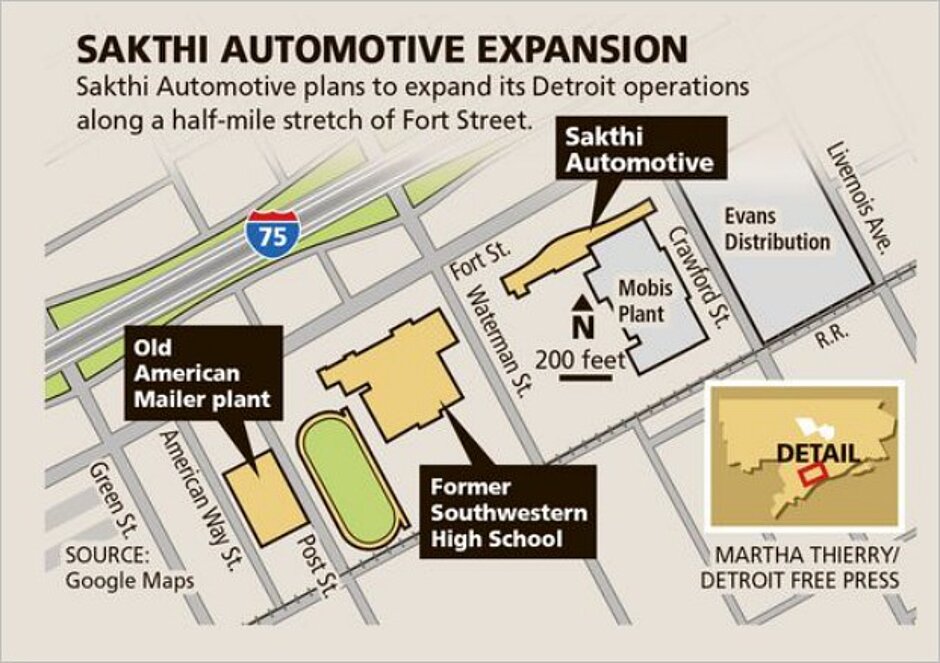Sakthi CEO Lalit Verma expects 1,000 auto parts jobs in southwest Detroit cluster by 2020.
India-based Sakthi Automotive is launching a major expansion of vehicle parts manufacturing along a half-mile stretch of Fort Street in southwest Detroit, with plans that include a new aluminum foundry, 350 more jobs and conversion of the former Southwestern High School into a worker training hub.
Today the Michigan Strategic Fund (MSF) approved a $3.5-million incentive grant for Sakthi, which will invest $31.8 million to expand in Detroit, rather than accept offers of free land, training grants and low-interest construction loans dangled by other states including Ohio, Georgia and South Carolina.
It all amounts to a huge bet on Detroit by an Asian auto supplier that had no North American manufacturing presence until January 2014, when it starting making parts in Detroit – at a time when many global automotive companies were flocking to Mexico and southern U.S. states.
Sakthi's rapid growth since arriving – $58 million in projected revenue this year, $150 million in 2016 and $450 million by 2020 – is a welcome bright spot in a city desperate for a manufacturing resurgence.
Detroit's downtown core is clearly on a rebound, but the vast city desperately needs industrial jobs in blighted areas like those around Southwestern High, which has been ravaged by metal scrappers and vandals since it closed in 2012.
Lalit Verma, Sakthi Automotive CEO for its U.S. and China operations, sees a huge opportunity and an interesting cultural fit between gritty Detroit and its Indian parent, the 84-year-old, family-owned the
Sakthi Group conglomerate with $2-billion annual revenue from products as diverse as sugar, textiles, wind energy and aluminum castings.
The longtime chairman of Sakthi Group in southern India, N. Mahalingam Gounder, who died in October at age 91, was a business leader, philosopher and educator. Sakthi has founded about 20 schools and vocational training schools in India.
So, aside from the investment in high-tech machinery to make parts for General Motors, Ford, Fiat Chrysler and other customers, an integral part of Sakthi's vision for Detroit is to partner with other firms and training programs such as Focus:HOPE's to develop a highly skilled supply of workers from the community.
According to briefing documents for today's MSF approval of state incentives, the Sakthi expansion includes the "planned purchase and reuse of the vacant former Southwestern High School, just west of their current facility through a joint venture. This facility would be used for manufacturing, advanced worker training, as well as employee wellness programs."
Sakthi also plans to provide day care and at-cost meals for employees, the company said.
In addition, the city of Detroit and Michigan Economic Development Corp. (MEDC) "will also recommend the approval of an MSF-designated Renaissance Zone for the planned expansion proposed by the Company at a later date," according to briefing documents prepared for the MSF board. Tax benefits in a Renaissance Zone can include a waiver of city income and utility users taxes, most city property taxes, county property taxes, and state income tax or single business tax.
Boundaries for the proposed zone would include Sakthi's current facility at 6401 W. Fort, as well as four nearby parcels.
Verma has accelerated Sakthi's growth timetable since arriving in Detroit, thanks to robust overall vehicle sales in North America combined with some bottlenecks in the supply chain. Some former competitors in Sakthi's product lines have collapsed, he said, and another recently filed for Chapter 11 bankruptcy, prompting some big customers to shift business to Sakthi.
As a result, Verma said, he recently boosted his plan for a machining plant expansion from 65,000 to 120,000 square feet
The choice to target Michigan over other U.S. locations was driven, Verma told me last year, by the state's position as the "legacy hub of the auto industry" and also the availability of labor. Sakthi employed about 65 engineers and sales and marketing people in Detroit when launching operations here, and hired some of its production workers directly out of a Focus:HOPE 12-week training program in Detroit.
Michigan offered a $1.5-million incentive grant to Sakthi back in 2012, and when its order volume grew rapidly, the firm also tapped $3 million a new Grow Michigan mezzanine loan fund to quickly ramp up output.
Earlier this month, Verma told U.S. Labor Secretary Thomas Perez that he he believes Sakthi could employ 650 people in Detroit by 2020, from the current level of about 170. In the summary documents for the MSF board meeting today, he projected what he acknowledged was a "more conservative" projection of 520 as a condition of the incentive package. An MEDC video about the project says many of the new jobs at Sakthi will pay $40,000 to $50,000 a year.
By 2020, he told me earlier this year, Sakthi will have invested nearly $70 million in southwest Detroit.
Sakhti's facility in southwest Detroit was built in 2003 by ArvinMeritor, but abandoned later in the decade when that company was broken up and the light-vehicle side of its business was phased out. Korean auto supplier Hyundai Mobis occupied some of the space in 2010 and still operates there, along with Sakthi.
Verma predicted that with Sakthi's expansion plans and hundreds of Mobis workers nearby, employment in the manufacturing cluster there could grow to 1,000 or more people in the next five years.
Source: Freep.com
×


